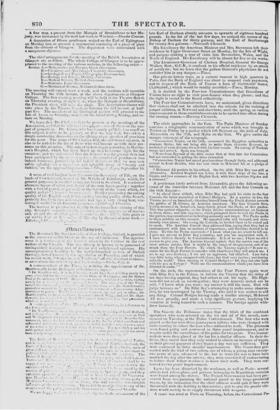The crisis approaches in the East. The Paris Menileur of
Sunday contains a telegraphic communication of news which was brought to Toulon on Friday by a packet which left Beyrout on the 24th of July, Alexandria on the 27th, and Malta on the 31st. 'We give entire the meagre .tittcinent of the telegraph.
"Commodore Napier, on the 14th, summoned the Egyptiau authorities to evacuate Syria; but not being able to make them evacuate Beyrout, he anchored at some distance fi'omn it with his four vessels. No convoy of Turkish troops had arrived. Syria was tranquil. "News from Beyrout of the 29th states that at that date the Commodore hail not succeeded in getting the town evacuated. "Commodore Napier had spread proclamations through Syria, and addressed several to Emir Beschir, who has sent them to Mehemet Ali as a pledge of fidelity. " Mehemet All persists in his refusal. On the 27th Rifat Bey was still at Alexandria. Admiral Stopford was before it with three ships of the line, a frigate, and twu steamers of the English fleet, with two Austrian frigates and a schooner."
A gentleman lately arrived from Alexandria gives the following ac- count of the interview between Mehemet Ali and the four Consuls on the 16th August-
" At about three o'clock, when Rifat Bey had paid his visits to the four Consuls, the latter assembled at Colonel Bodges's. At a quarter to five, the Viceroy passed on horseback, directing himself from the Frank district towards Cite garden of M. Gibara, an Austrian merchant. The four Consuls then, having mounted on horseback, immediately joined the Pasha at this garden. This was against etiquette, as the Turks receive communications on business in divan alone; and this eagerness, which prompted them to seek the Pasha in the garden, was considered as indicating animosity and anger. The Pasha spoke to them publicly- on this account. He appeared calm and tranquil, and mate sioually even jocose. On seeing the Consuls, be invited them to be seated and to speak. The Austrian Consul then addressed him, saying that they had to communicate with him on matters of importance, and thereftwe desired to he alone. To this the Pasha answered—. I know what you are about to tell me. I gave my answer to lint By yesterday, and you are acquainted with it. 1 have written directly to Constantinople. It is of no use; 1 have no othcr answer to give you. The Austrian Consul replied, that the matter was of the most serious nature, that it might be the cause of disagreement, and of an attack from the Four Powers. To which the Viceroy replied—. It now re- mains for the !Ugh Powers to consider with what threes they will attack me. I arn in iny own territory ; I am not an aggressor, but attacked. lain but a very little being when compared with them; bat God totes justice ; and destiny rules the world."rhen turning to Colonel lodges—' Do they not also fight with the pen in Europe ? Write me the communication which you have been directed to make.'"
On the 26th, the representatives of the Four Powers again went with Milo Bey to the Palace, to inform the Viceroy that the delay of ten days having expired, they had orders to ask his reply. His High- ness did not await an interrogation ; they were scarcely seated ere he said, " I know what you waut ; my answer is still the same. God will judge between us." On Rifat Bey's attempting to make some observa- tion, he was interrupted by the Viceroy, who said it was useless to add any thing. Colonel Hodges having made a similar attempt, Mehemet Ali rose proudly, and made a very significant gesture, implying hits vexation at being teazed in such a manner. The foreign agents with- drew instastly.


























 Previous page
Previous page